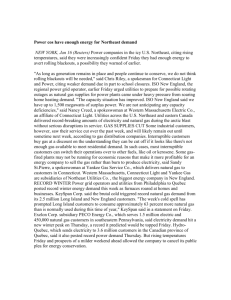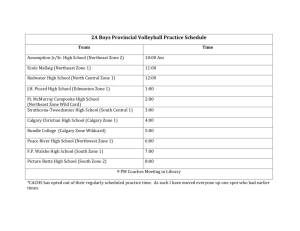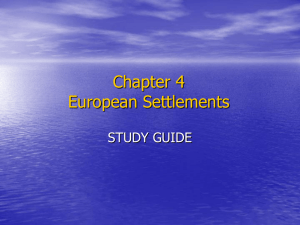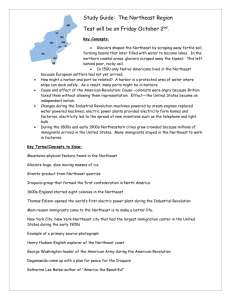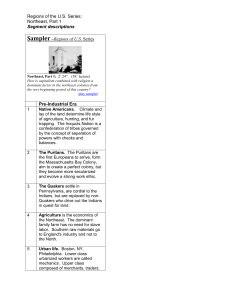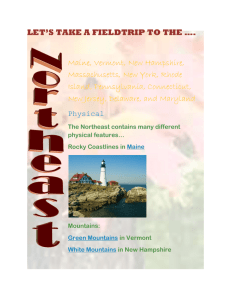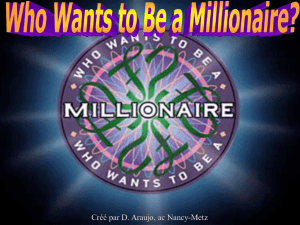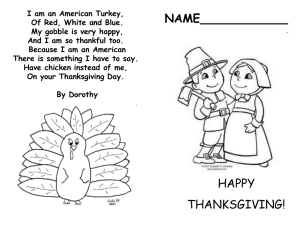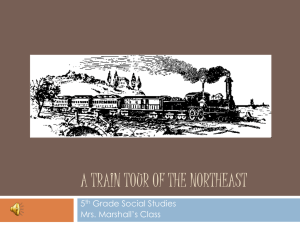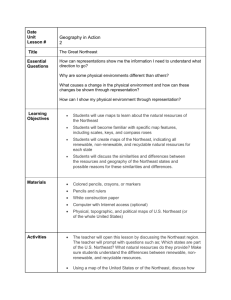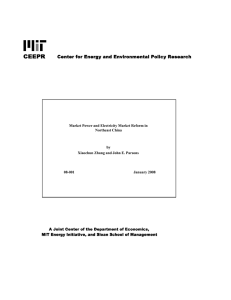Destination*Northeast STUDY BUDDY (sign me for +3)
advertisement
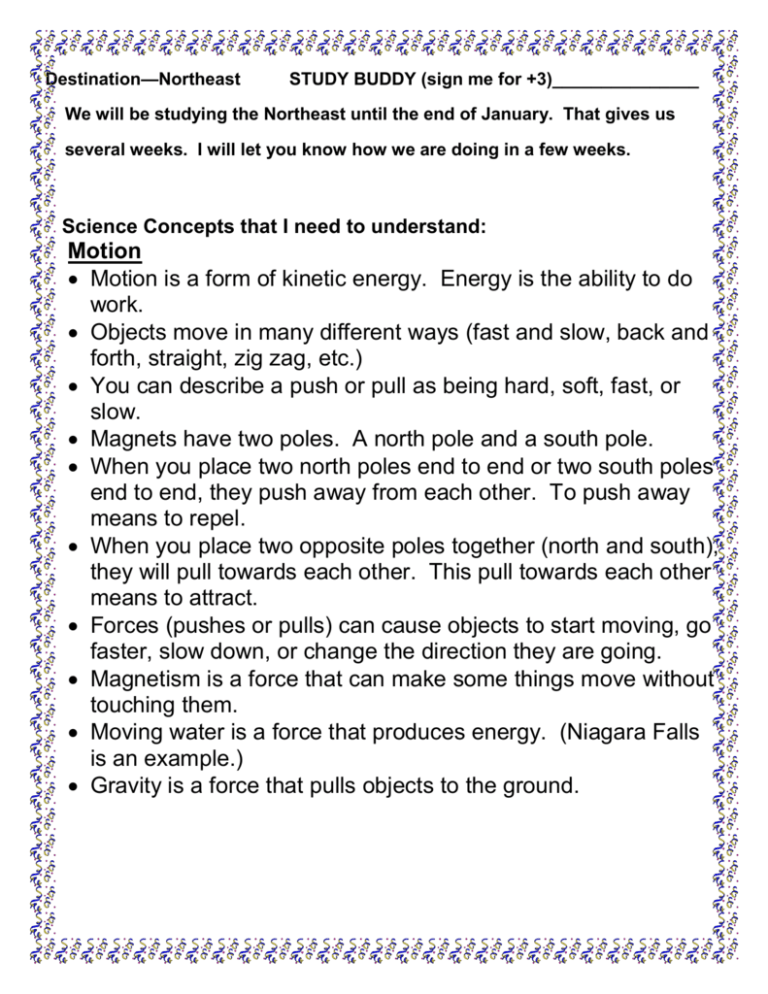
Destination—Northeast STUDY BUDDY (sign me for +3)_______________ We will be studying the Northeast until the end of January. That gives us several weeks. I will let you know how we are doing in a few weeks. Science Concepts that I need to understand: Motion Motion is a form of kinetic energy. Energy is the ability to do work. Objects move in many different ways (fast and slow, back and forth, straight, zig zag, etc.) You can describe a push or pull as being hard, soft, fast, or slow. Magnets have two poles. A north pole and a south pole. When you place two north poles end to end or two south poles end to end, they push away from each other. To push away means to repel. When you place two opposite poles together (north and south), they will pull towards each other. This pull towards each other means to attract. Forces (pushes or pulls) can cause objects to start moving, go faster, slow down, or change the direction they are going. Magnetism is a force that can make some things move without touching them. Moving water is a force that produces energy. (Niagara Falls is an example.) Gravity is a force that pulls objects to the ground. Electricity Electricity is a form of potential energy. Energy is the ability to do work. Electricity can only flow if it has a closed circuit. A closed circuit can produce sound, light, or motion. Some materials conduct electricity. They are called conductors. Some materials do not allow electricity to flow. They are insulators. There are two kinds of circuits. Series circuits are like Christmas lights. When one light goes out, the entire strand goes out. Parallel circuits are like in your house. You can turn one light off without turning off every light in the house. Social Studies concepts I need to understand: Urban Urban areas are cities. The urban areas of the Northeast have very large populations. Many things are different in the city. Housing—apartments; Transportation—subways, taxis, buses, walking; Jobs— many businesses; Recreation—ballgames (major league, NBA, NFL), plays, concerts, restaurants, parks, shopping, museums; Population—crowded New York City is the largest city in the United States. The Statue of Liberty is found in New York City. It is a symbol of freedom. Boston, Philadelphia, and Washington, D.C. are other large cities of the Northeast. Rural Rural areas are country areas. The rural areas of the Northeast are similar to the small towns of Kentucky. Many things are different in the country. Housing—houses, yards; Transportation—cars; Jobs—small businesses; Recreation—ballgames (little league, high school), riding bicycles, ice skating in the winter, sledding; Population—fewer people per square mile Government Government provides services to the people of our country. (police protection, fire fighters, garbage pick-up, water treatment, road maintenance, snow removal, education, public libraries, public parks, etc.) Governments are formed to establish order. (laws) Governments are formed to provide security. (military) As citizens of the United States, we have rights and responsibilities. (The freedom to choose our leaders; the responsibility to vote. The freedom to use the public parks; the responsibility to pick up trash. Government services are paid for by collecting taxes from the people who live there. Washington, D.C. is the capital of our country. Our president, President Obama lives in the White House with his family. Our legislators (people who make the laws) work in the capitol building in Washington, D.C. Economics Businesses have changed over time because the needs of the people change over time. Natural Resources come from nature. (water, coal, oil, natural gas, trees) Human Resources are people who provide services. (fire fighters, teachers, police officers, workers, etc.) We have needs and wants. Some businesses provide for our needs. Some businesses provide our wants. A person who buys a product is a consumer. A person who makes a product is the producer. In your business, the supply is how many products you have to sell. In business, the demand is how many products people want to buy. If your demand is too high, you don’t have enough products. This is scarcity. The extra money you make from your business after you pay all your bills and your workers is your profit. Businesses in a community have to work together. An assembly line helps a business produce more products in less time. This is called mass production. A factory is a business that uses assembly lines. Geography There are 11 states in the Northeast. Maine, Vermont, New Hampshire, Massachusetts, Connecticut, Rhode Island, New York, Pennsylvania, New Jersey, Delaware, and Maryland. Be able to locate them on a map. There are 5 Great Lakes in the United States. Two of these lakes are part of the Northeastern region. Lake Erie and Lake Ontario. Niagara Falls is located between these two great lakes. Be able to label them on a map. The Atlantic Ocean is the eastern boundary of the Northeastern region. A cape is a pointed piece of land that sticks out into a sea, ocean, lake, or river. The sea refers to the ocean. BONUS POINTS: Each state has a capital city. Augusta, Maine Montpelier, Vermont Concord, New Hampshire Boston, Massachusetts Hartford, Connecticut Providence, Rhode Island Albany, New York Harrisburg, Pennsylvania Trenton, New Jersey Dover, Delaware Annapolis, Maryland *The history content will be assessed in literature circles and project-based learning at school. History Eastern “woodland” Indians—Shaman, Sachem, Seminole, Powhatan, Delaware, Susquehanna, Mohican Massachusett, Iroquois, and Cherokee once lived in the Northeastern region. The early Europeans, who came to America, came from many countries of Europe. (England, France, Germany, Italy, Spain, Denmark, Ireland, and Scotland) The first Europeans worked together with the Native Americans in order to survive. Our country was very different during the Colonial Times. During the earlier days of America there were 13 colonies that were governed by England. The colonies were divided into 3 different regions (Southern, Middle Atlantic, New England). Three ships were sent to America by the London Company in England looking for gold and other riches. The first continuous English colony was Jamestown. Jamestown was established by Captain John Smith in the Chesapeake Bay in the year 1607. The people of Jamestown traded with the Powhatan Indians. Diseases killed many of the people, both colonists and Indians. Colonists came to Massachusetts looking for religious freedom. These groups were called the Pilgrims and the Puritans. Pilgrims came from England on three ships, one ship being the Mayflower. The Pilgrims landed at Plymouth. The Pilgrims were helped by the Indians. Remember the first Thanksgiving. The Puritans established another settlement and focused on reading and education. I have studied this social studies and science content with my child,________________________. Parent signature________________________________
